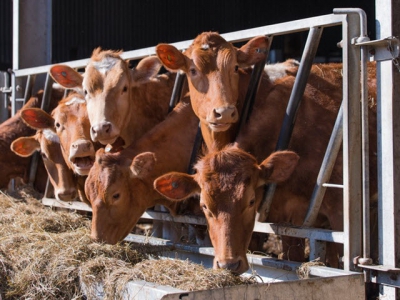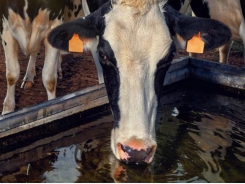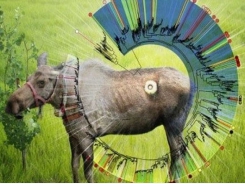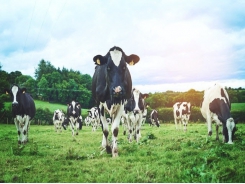Dietary fat may be key to dropping dairy cow GHG emissions

Adding supplemental fat to dairy cow diets may reduce cows’ methane yield regardless of grain used in the diet, say researchers.
Feed additives could play a role in lowering methane emissions from grain-fed dairy cows. photo © GettyImages/sponner
“The objective of this research was to determine the effects of fat supplementation on methane emissions, MY (methane per kg of DMI), and milk yield from cows fed diets containing either corn or wheat grain,” the researchers said. “We hypothesized that (1) cows fed a diet containing wheat would produce less methane and have lower MY than cows fed a diet containing corn and that (2) methane mitigation from fat supplementation would occur irrespective of the type of grain in the basal diet.”
The researchers found that cows on a wheat-based diet generated more methane yield, or methane per kg of dry matter intake (MY), than cows did on a corn-based diet.
However, adding higher levels of supplemental fat to cow diets reduced MY for all diets, regardless of the grain type included, they said.
“ECM [energy-corrected milk] was increased in cows fed the corn-based diet and decreased in cows fed the wheat-based diet,” they added. “It is concluded that the grain component in the basal diet does not affect the mitigating effects of dietary fat supplements on MY.”
Reducing methane production
Ruminant production of methane and the release of ruminally generated methane has been linked to about a 6% gross energy intake loss for dairy cows, the researchers said.
Methane is considered a “potent greenhouse gas” and there is continuing interest in reducing the production of enteric methane, they said.
One strategy to mitigate methane production is adding mitigating supplements to animal feed.
“It has been reported that diets containing high proportions of starch-rich grains such as wheat and corn produce less methane yield (MY) than forage-based diets,” they said. “Diets containing starch reduce enteric methane production by inhibiting the capacity of ruminal methanogens to take up hydrogen by reducing ruminal fluid pH and favoring the production of propionate over acetate.”
“The production of propionate in the rumen reduces MY because propiogenesis utilizes metabolic hydrogen that would otherwise be available to produce methane,” they added.
Past research found that swapping wheat for forage in dairy cow diet lowered MY by up to 10% and did not alter milk volume, the researchers said. Similarly, MY dropped 31% when half of the forage used in a dairy cow diet was switched with wheat grain and exchanging corn for wheat grain saw cows produce 33% less MY.
Why add supplemental fat to the diet?
In addition to changing forage ingredients to a wheat or corn grain, adding additional supplemental fat to a dairy cow diet also may play a role in lower enteric methane production, the researchers said.
“Dietary fat reduces methane production in the rumen by reducing hydrogen accumulation through fatty acid biohydrogenation, reducing the intake of fermentable OM, reducing fiber digestion, and by inhibiting the activity of ruminal methanogens,” they said.
Previous research found that MY dropped 17% when beef cattle diets had sunflower oil added at 5% of dry matter (DM) and grass-fed dairy cows saw a reduction in methane production when the dietary fat level was increased by supplemental sunflower oil, they said. Adding canola oil to the diets of beef and dairy cows lowered MY by 15%.
But, no change in methane production was noted when a fat source was added to a barley-based diet supplemented with pasture hay, they said. “Thus, it seems that the basal diet may influence the degree of methane mitigation resulting from dietary fat supplementation,” they added.
Feeding trial details
In the feeding trial, 32 cows were given one of four diets during a 35-day experimental period, the researchers said. Cows were on a common diet for days 1-7, moved to the experimental diet and on an adaptation period from day 8 to 28 and methane measurements were collected on days 29 through 35.
“All 4 dietary treatments consisted of a base of 11.5 kg of DM/d of chopped alfalfa hay, 1.8 kg of DM/d of solvent-extracted canola meal, 0.2 kg of DM/d of minerals (calcium 10.5%, magnesium 11.2%, potassium 4.4%, chloride 6.6%, sulfur 14.2%, and copper 34.4%), and 42 mL/d of Bloat-Drench,” they said. Trial diets included a corn diet (CRN) that had 9kg of DM/d of crushed corn, that diet with supplemental fat 0.8kg/d of canola oil (CPF), a wheat-based diet (WHT) with 8kg of DM/d of crushed wheat grain, or the wheat diet with 0.8kg/d canola oil (WPF).
Diets were designed to provide about 90% of the “mean ad libitum feed intake” recorded for a covariate period, they said.
“This slight restriction in level of feed intake was chosen to allow comparison of MY at similar total DMI and to ensure that the cows in both treatment groups consumed diets with similar forage to concentrate ratios.”
Feed samples were collected, refusals were recorded and dry matter intake (DMI) was established for each feeding, they said.
Milk yield was checked for each cow at every milking and samples were collected for analysis on days 5-7, 12, 19-26 and 31-35.
Methane production was recorded on days 29 to 35, the researchers said. Ruminal fluid samples were gathered on day 35 and volatile fatty acid proportions were established along with ammonia concentration.
The pH and temperature of ruminal fluid were monitored on days 28 to 35, they added.
Results
There tended to be an interaction between grain type, supplemental fat and milk yield and there was more of an interaction between grain type and fat use for milk fat yield, lactose yield and protein yield, the researchers said.
Milk fat yield was similar for cows on both corn diets but was lower for cows on the fat-supplemented wheat-based diet than those on the wheat-based diet, they said.
Cows on the corn diet produce less protein and lactose than cows on the fat-supplemented corn-based diet although there were no changes for cows on either wheat-based diet.
Energy-corrected milk production increased when fat was added to corn-based diets but fell for cows on the wheat-based diet when fat was added, they said.
“The decrease in milk fat concentration was likely caused by reduced digestibility of fiber in the rumen as a consequence of a high level of fat intake and also by reduced mammary lipogenesis caused by adding polyunsaturated fats to a starch-rich diet,” they added.
“An interaction effect was observed between grain type and fat supplementation on milk fat concentration,” the researchers said. “The decrease in milk fat concentration was more pronounced when cows fed diets that contained corn were supplemented with fat than when cows were fed diets that contained wheat.”
Average methane emissions also were altered by grain type and added dietary fat, they said. Adding fat lowered daily methane production for cows on the wheat-based diet, but not for cows on the corn diet.
“Methane yields for diets containing corn were less than for diets containing wheat, and diets containing fat also had lower MY than those fed diets not supplemented with fat,” they said.
Cows on corn-based diets had lower methane intensities than those on the wheat-based diets, the researchers said.
There also tended to be an interaction between grain type and fat supplementation in relation to methane intensity.
“Feeding cows a diet containing a high proportion of wheat grain resulted in greater MY than a diet containing a high proportion of corn, and grain type had no effect of on milk yield,” the researchers said.
“Thus, we reject our first hypothesis that cows fed a diet containing a high proportion of wheat would produce less methane and have lower MY than cows fed a diet containing a high proportion of corn.”
However, dietary grain and fat use did not alter concentrations of NH3-N, they said.
Cows on corn diets had lower total ruminal VFA levels than those on wheat-based diets and adding fat to the diets did not alter the concentration, they said.
Cows on corn diets had higher amounts of acetic acid, less propionic acid and a greater acetic acid to propionic acid ratio than those on the wheat-based diets, they said. Cows on non-supplemented diets had more acetic acid and similar levels of propionic acid.
“Feeding diets containing corn resulted in greater proportions of iso-butyric acid and iso-valeric acid than feeding diets containing wheat, and fat supplementation resulted in lower proportions of iso-butyric acid and iso-valeric acid than not supplementing with fat,” the researchers said. “Feeding diets containing corn resulted in lower proportions of n-butyric and n-valeric acid compared with diets that contained wheat.”
Wheat-based diets produced more entodinia and total protozoa than corn-based diets, but fat had influence, they said. Grain type did not alter average pH, minimum or maximum pH but supplemental dietary fat lowered mean pH.
Source: Journal of Dairy Science
Authors: P. Alvarez Hess, S. Williams, J. Jacobs, M. Hannah, K. Beauchemin, R. Eckard, W. Wales, G. Morris, P. Moate
Related news
Tools

Phối trộn thức ăn chăn nuôi

Pha dung dịch thủy canh

Định mức cho tôm ăn

Phối trộn phân bón NPK

Xác định tỷ lệ tôm sống

Chuyển đổi đơn vị phân bón

Xác định công suất sục khí

Chuyển đổi đơn vị tôm

Tính diện tích nhà kính

Tính thể tích ao




 Project targets heat-stressed dairy cows
Project targets heat-stressed dairy cows  Better protein labelling of dairy feeds required, says…
Better protein labelling of dairy feeds required, says…